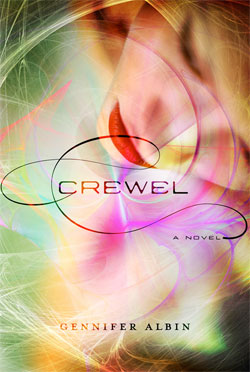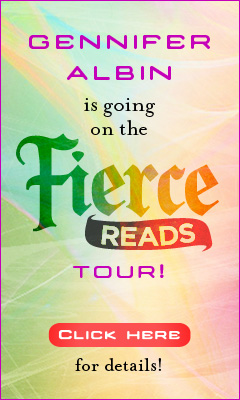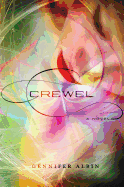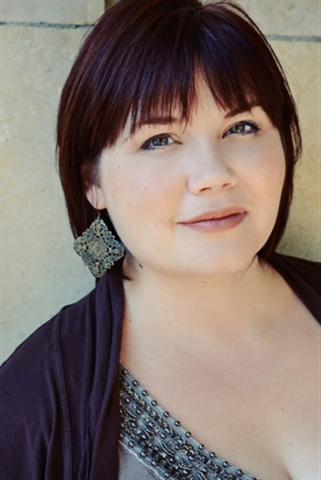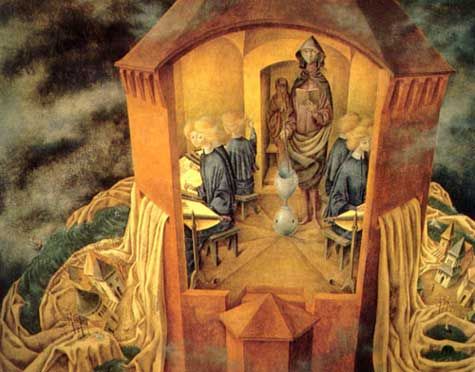Crewel
by Gennifer Albin
What would it be like to be born with a talent that could help shape the world, and then be told to hide it? That is Adelice Lewys's predicament in Gennifer Albin's gripping debut novel, the first in a planned trilogy, about Adelice growing up and taking responsibility for the gift she is given.
The people of Arras revere the Spinsters, the skilled weavers who create and maintain their world. They want to touch them for their talent and their beauty. With her natural weaving skills, Adelice could be one of them. But from the time she turned 11, Adelice's parents have trained her to hide her abilities, to hone the appearance of clumsiness. The story begins as 16-year-old Adelice goes to be tested along with her peers to see if she has a talent for weaving. On the last day of the test, her urge to weave overrides her parents' years of training, and she reveals herself to be one of the most talented weavers the Guild of Twelve has ever seen. When Cormac Patton, the Coventry Ambassador for the Guild of Twelve, and his team come to collect Adelice, her family attempts to hide her and her 12-year-old sister, Amie, in hidden tunnels they've created in the cellar. But Adelice is captured, her father killed, and the fates of her mother and sister are unknown.
Albin takes readers deep inside the belly of the beast, to a government that elevates some of its most prized Spinsters and relegates others to dungeon cells. That's where the Guild places Adelice at the start--in the bowels of the Western Compound, the largest Coventry of Spinsters in Arras. She is assumed to be a rebel by her parents' actions, but her skills are too great to keep her sequestered there for long. Instead, the Guild finds other ways to isolate her. Each Spinster gets a makeover, skin that's smooth, clothes of silk. Maela, whose job is to welcome and train the Eligibles, tells Adelice, "You have power… but, Adelice... you must not presume you are in control." Maela has it out for Adelice; Cormac Patton, too, has his eye on Adelice. Adelice finds herself caught between Maela and Cormac, who have a smoldering history. Meanwhile, Maela's "assistant," gorgeous Erik, flirts dangerously with Adelice--is it because he knows her powers? And Jost, the head valet, recognizes a kindred rebellious spirit in Adelice. "Play dumb," Jost tells her in those first days of her imprisonment at Coventry. "There are worse things than death here."
The author asks probing questions about whether Adelice's rare talent is a blessing or a curse. Adelice must make her own way in the world, realizing that her parents did not disclose the whole truth about the Guild and the way society worked. The heroine's gift has always isolated her from others. From a very early age, she could see things others could not see--or never looked closely enough to notice. Adelice, bullied by a next-door neighbor who turned all their classmates against her, stood up to the bully at age eight in order to rescue two unborn birds in a nest. In her desperation to save them, Adelice noticed the fabric that made the world around her. She noticed gold threads moving in a horizontal direction, and understood that they must represent time itself. Adelice reached for the strands, attempting to turn back time through the manipulation of the golden thread, to the moment before the mother bird left the nest. But she discovered that time only moves forward.
Adelice's sense of isolation only grew as her parents taught her to keep her skill hidden. Even high in her luxurious tower room at the Coventry, Adelice must keep her secret. She realizes the views from the windows are not real, reaches out to touch the fabric and forms a storm. Enora, her kind mentor, walks in on Adelice and warns her, "You must never tell anyone else you can do that. Always use a loom to weave--try not to do it without one, even when you are alone." Maela does all she can to keep Adelice isolated and alone. Maela orchestrates a rivalry between Adelice and Pryana, another skilled Spinster, when she asks Adelice to remove a thread. Each thread represents a life, and Adelice challenges Maela, saying there's no risk posed by the thread in question. As a rebuttal, Maela rips an entire section out of the loom--the academy attended by Pryana's younger sister. This plants a seed of hatred in Pryana for Adelice. And it gets Adelice thinking about whether a ripped thread can be repaired. It's a moment that resonates with poignancy later in the novel, when Loricel, the Creweler, the most powerful Spinster in Arras, who spins raw materials into the fabric of their world, asks Adelice to remove the thread of an older woman. "Removing this strand feels like a violation--an act against nature," Adelice tells Loricel. "It's the life force of this piece, and everything this thread touches, regardless of our attempts to repair around it, will be irrevocably damaged once it's gone."
Only Loricel understands the tremendous burden that her gift places upon Adelice-- the yin and yang of creation and destruction, and the responsibility of carrying out the decision of who lives or dies. Is it Adelice's responsibility to tell others the truth? Or must they discover it on their own, as she did? Can she assume this godlike responsibility, or must she find a way to escape? In this first installment, Adelice must choose her path. Readers will be eager to return to the coming episodes to see how her choice affects the world around her. --Jennifer M. Brown



